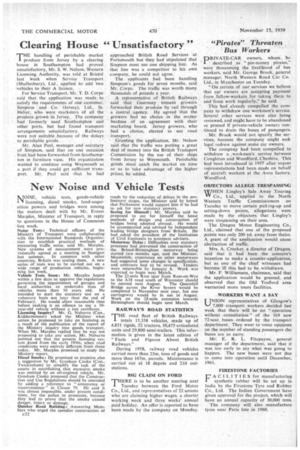Clearing House " Unsatisfactory "
Page 82

If you've noticed an error in this article please click here to report it so we can fix it.
THE handling of perishable market
produce from Jersey by a clearing house in Southampton had proved unsatisfactory, Mr. S. W. Nelson, Western Licensing Authority, was told . at Bristol last 'Week when Service Transport (Shaftesbury), Ltd., applied to add two :vehicles to their A licence, •
For Service Transport, Mr. T. D. Corpe said that the application was made to satisfy the requirements of one customer, Simpson and Co. (Jersey), Ltd., St. Helier, who were marketers of all the produce grown in jersey. The company had formerly used Southampton and other ports, but had found transport arrangements unsatisfactory. Railways were not suitable because of the delays to perishable goods. . • Mr. Alan Peel, manager. and secretary of Simpson, said that on one occasion fruit had been forwarded from Southampton in furniture vans. His organization wanted to continue using Weymouth as a port if they could get sufficient transpoet. Mr. Peel said that he• had approached British Road Services at Portsmouth but they had stipulated that Simpson must use one shipping line. As that line was a competitor to his own company, he could not agree.
The applicants had been handling Simpson's goods for seven months, said Mr. Corpe. The traffic Was worth Many thousands of pounds a year. • A representative of British Railways , said that Guernsey tomato growers _ forwarded their produce by rail through a central agency. He agreed that the growers had no choice in the matter because of an agreement with their marketing board. Jersey growers, who had a choice, elected to use road transport.
.Granting the application; Mr. Nelson said that the traffic was putting a great deal of money into the British Transport Commission by the use of their ships from Jersey to Weymouth. Perishable goods must catch the market on time so as to take advantage of the higher prices, he added.
































































































































































































































































